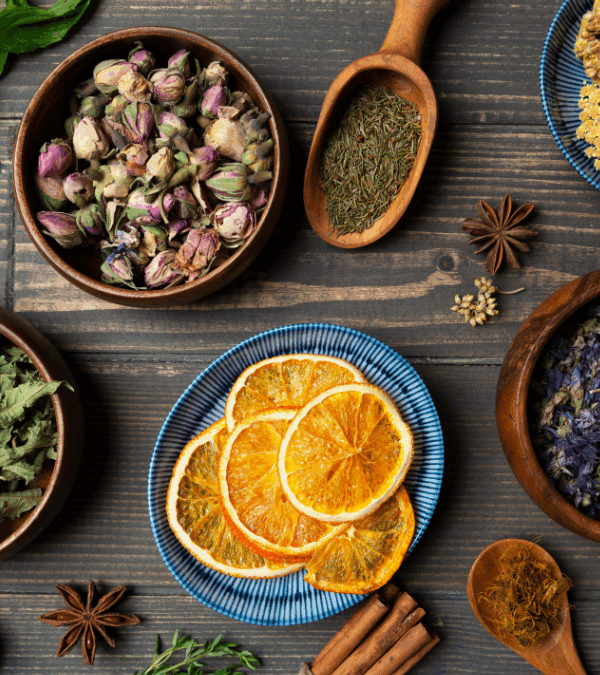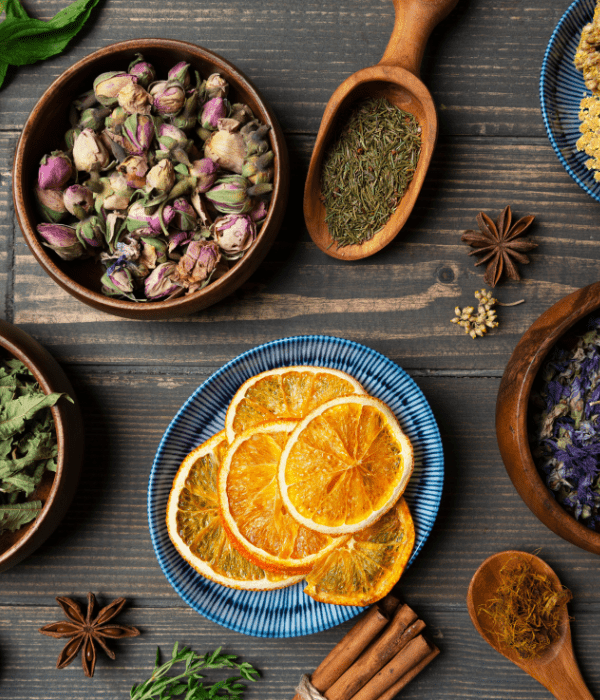How Herbal Teas Can Benefit Your Health
The topic of our free monthly webinar at the end of July was ‘How Herbal Teas Can Benefit Your Health’ and was hosted by NCIM educational co-director Dr Vivien Rolfe. As well as working on the NCIM educational team, Viv is a health researcher with extensive experience in both nutrition and herbal research, having previously worked at Pukka Herbs, a leading herbal tea and supplement company. Viv believes that everyone can enjoy the simplicity and joy of using herbs to care for themselves in daily life.
The Science Behind Herbal Teas: Polyphenols and Nutritional Benefits
Herbal teas carry a long tradition of medicinal use, with plants serving as remedies for various ailments for millennia. Viv highlighted how herbs can be used in day-to-day wellness, from boosting energy in the morning with invigorating ginger and turmeric teas, to winding down in the evening with calming chamomile or lavender infusions.
Herbal teas offer numerous benefits, both as a form of nutrition and as a therapeutic tool. Viv explained that herbal teas are hydrating, typically low in caffeine, and often free from added sugars, making them a great alternative to sugary beverages. But beyond hydration, herbal teas also provide valuable plant compounds like polyphenols, antioxidants which are found in many colourful fruits, vegetables, and herbs, that are crucial for protecting the body from oxidative stress and supporting long-term health. Herbal teas are packed with polyphenols, and Viv talked about how drinking herbal teas can be an excellent way to “eat the rainbow,” as these colourful plant compounds are found in a wide variety of herbs. Studies have shown that regular consumption of polyphenols is linked to improved metabolic health, reduced inflammation, and a lower risk of chronic disease.
A recent large-scale study published in the UK Biobank demonstrated the positive effects of polyphenols on longevity and overall health. In this study, tea drinkers, especially those consuming green and black tea, showed lower rates of chronic disease and mortality. Interestingly, mint tea was shown to contain polyphenols equivalent to those found in green tea, making it an excellent choice for those who prefer a caffeine-free alternative.
One area of particular interest in the world of herbal medicine is metabolic health, especially in light of modern lifestyles that often lead to metabolic disorders. Viv spoke about several herbs that have been shown to support healthy metabolism and blood sugar regulation. For example, cinnamon and ginger have been extensively studied for their ability to help control blood sugar levels, while other herbs like rosemary and sage are known for their cognitive and memory-boosting properties.
One key aspect of herbal tea that Viv discussed is the importance of aroma. Research has shown that our sense of smell plays a significant role in cognitive function and emotional well-being. In fact, some studies suggest that engaging with aromatic herbs like rosemary, mint, or lavender can improve alertness, reduce stress, and even boost cognitive performance. In the webinar, Viv encouraged fellow tea drinkers to savour the aromas of their herbal teas, inhaling the steam as well as tasting the brew. This sensory experience not only enhances enjoyment but can also amplify the health benefits of the herbs.
Making Your Own
In the webinar, Viv emphasised how easy it is to replicate many commercial herbal tea blends at home, and making your own teas is more accessible than people might think. She told us a great hack: most packaged teas list their ingredients, providing a great starting point for creating and making your own personalised blends. I love this idea as trying to think up your own tea blend from scratch could be rather daunting! So for instance, popular supermarket teas may include combinations of turmeric, chamomile, cardamom, ginger, and cinnamon, all of which are simple and enjoyable herbs that anyone can work with. Viv encouraged herbal tea enthusiasts to try recreating these blends at home, particularly if they already enjoy herbal teas but are looking to experiment.
When it comes to herbal tea, Viv advocated for choosing organic herbs whenever possible. In the webinar she emphasised the importance of sustainability, particularly in light of the widespread use of plastic in tea bags. To reduce the environmental impact, Viv suggested opting for loose-leaf tea or growing your own herbs at home. Growing herbs like mint, lemon balm, or rosemary in a garden or allotment not only provides fresh ingredients but also contributes to a more sustainable lifestyle. When buying pre-made teas, Viv advised to read the labels carefully to ensure that the herbs listed match the claims on the packaging. Many teas, for example, may advertise “rhubarb and orange” but, upon closer inspection, reveal that the dominant ingredients are actually apple and hibiscus, along with synthetic flavourings to make them cheaper.
Viv encouraged people to start off simply, especially when beginning their herbal tea journey. She spoke about growing easy-to-care-for herbs like mint, rosemary, and thyme in a garden, patio or even a windowsill. These Mediterranean herbs make for excellent, refreshing teas and are widely available from supermarkets in pots. For those without a garden, dried herbs can also be used to make delicious blends that last for months. Over the years, Viv has moved away from shop-bought teas in favour of blending her own herbal creations. Her passion for this practice was inspired during her time at Pukka Herbs, where she worked alongside skilled herbalists and integrative medicine practitioners.
For those interested in creating their own blends, Viv recommended starting with a primary herb such as chamomile, mint, or ginger, and balancing it with complementary herbs that will enhance flavour or therapeutic effects. For example, lemon balm, marigold, or lavender can be used to create calming, soothing blends, while spices like ginger and cinnamon will add warmth and zest. By understanding how to balance base herbs, middle notes, and top flavours, we can all experiment with creating personalised teas that serve specific purposes, whether it’s to energise, calm, or support our digestion.
Viv also offered a few practical tips for making and storing herbal teas. She recommended using a teapot rather than a mug to extract the maximum flavour and the medicinal compounds from the herbs. For those who want a stronger infusion, keeping the teapot warm with a traditional tea cosy or even a tea towel helps to retain heat, ensuring a richer brew. When drying herbs at home, it’s essential to keep them in a cool, dry place, away from direct sunlight, to preserve their aroma and beneficial compounds. So proper storage in sealed containers will also help ensure that dried herbs stay fresh for longer.
Conclusion: Empowering Individuals to Integrate Herbs into Daily Life
Viv’s overarching message was that herbs are not just for specialists; they are accessible to anyone looking to improve their health and well-being in a simple, sustainable way. This could be through growing herbs at home, blending teas for specific health goals, or incorporating herbs into our own daily routines. The power of herbal medicine really is available to everyone and by embracing the wisdom of plants and learning to craft your own personalised blends, anyone can support their own health in this way. Viv encouraged individuals to start small, experiment with blending, and enjoy the sensory experience of herbal tea drinking. ENJOY!
Dr Elizabeth Thompson


